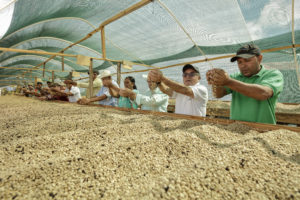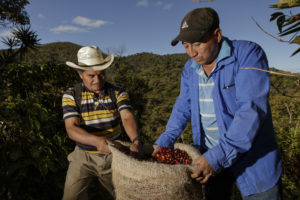In Blue Harvest, we have been working on improving water use efficiency and waste water treatment in wet mills, protecting water recharge areas in the farms by applying soil and water conservation practices (here and here) with a focus on regenerative coffee , as well as working with water system operators and water committees to improve the management and upkeep of their water systems and protection of their water sources. A few months ago, we highlighted the SCA farm profitability report and its conclusion that good agricultural practices do not always yield to higher income. Yet for the farmers, the practices have increased coffee yields, and farmers have obtained higher prices because Blue Harvest has identified and worked with buyers who care about water issues at origin and who are willing to partner in this process.
While we have been working with cooperatives, farmers and local actors on water issues, we have simultaneously improved farm yields and coffee quality. Through this process we have been able to demonstrate to coffee buyers the impact, and the cooperatives have been able to sell their coffee at higher prices by improving quality of their coffee and by protecting water resources.
In Morazán, El Salvador, the Cooperative “San Carlos Dos”, with farms at altitudes from 900-1600m, is home to over 29 water sources. These provide water for over 10,000 people. San Carlos Dos, created during the Salvadoran agricultural reform, saw their coffee sales decrease by 84% from 2011 and 2014 due to coffee leaf rust. In 2015-2016, they began to pull themselves back together by taking advantage of the support offered by Blue Harvest and others. One of the big improvements has been to map out the farm and identify the lots b y varieties – Borbones, Pacamaras and Catimores. As part of their improvements in quality, they have worked on picking only the ripe fruit and implementing a more careful drying process. They are processing different coffee qualities separately, and creating lots based on the needs of their clients. In the 2016-2017 season, with support from Blue Harvest, they directly exported their first container of coffee generating over $120,000 in income. In this current season, they have contracts with Falcon and Café Nero with price differentials of up to +$0.20/lb generating over $200,000 of income based on the coffee quality and due to the Blue Harvest approach. The improvements in yields and in price has allowed the cooperative to cover their production and operational costs for the first time since 2012 and have turned a modest profit. The cooperative has provided an example on how perseverance and the right investments can pay off. This month, they competed in the Cup of Excellence of El Salvador for the first time.
y varieties – Borbones, Pacamaras and Catimores. As part of their improvements in quality, they have worked on picking only the ripe fruit and implementing a more careful drying process. They are processing different coffee qualities separately, and creating lots based on the needs of their clients. In the 2016-2017 season, with support from Blue Harvest, they directly exported their first container of coffee generating over $120,000 in income. In this current season, they have contracts with Falcon and Café Nero with price differentials of up to +$0.20/lb generating over $200,000 of income based on the coffee quality and due to the Blue Harvest approach. The improvements in yields and in price has allowed the cooperative to cover their production and operational costs for the first time since 2012 and have turned a modest profit. The cooperative has provided an example on how perseverance and the right investments can pay off. This month, they competed in the Cup of Excellence of El Salvador for the first time.
In Honduras, Cooperative COMICOVEL, located in San Juan Intibucá and founded in 2015, brings together farmers who are located in watersheds that provide potable water for over 7,000 people. This cooperative has worked to not only protect water sources in their highlands by implementing water and soil protection practices, but they have focused on improving their coffee quality through better post-harvest processes. They have installed solar dryers, and they are working with their members to provide quality feedback on their coffees. This focus on quality has allowed them to export for two years consecutively to DR Wakefield, and this year to Café Nero, with differentials as high as $0.14/lb generating over $900,000 of income. Our Blue Harvest Regional Supply Chain Coordinator, Wendell Erazo, summed it up, “As a result of their efforts, COMICOVEL already has a contract for 2019 with a +15 differential without any certification. This is solely based on their Blue Harvest focus on protecting water resources while assuring coffee quality. The buyer is committed because they want to buy sustainable coffees, and they see Blue Harvest cooperatives as one of their sources.”
year to Café Nero, with differentials as high as $0.14/lb generating over $900,000 of income. Our Blue Harvest Regional Supply Chain Coordinator, Wendell Erazo, summed it up, “As a result of their efforts, COMICOVEL already has a contract for 2019 with a +15 differential without any certification. This is solely based on their Blue Harvest focus on protecting water resources while assuring coffee quality. The buyer is committed because they want to buy sustainable coffees, and they see Blue Harvest cooperatives as one of their sources.”
Both coops are motivating their farmer members to stay in coffee, while improving the quantity and quality of potable water available for neighboring communities in origin. The lasting impact will not be possible without market partners.


